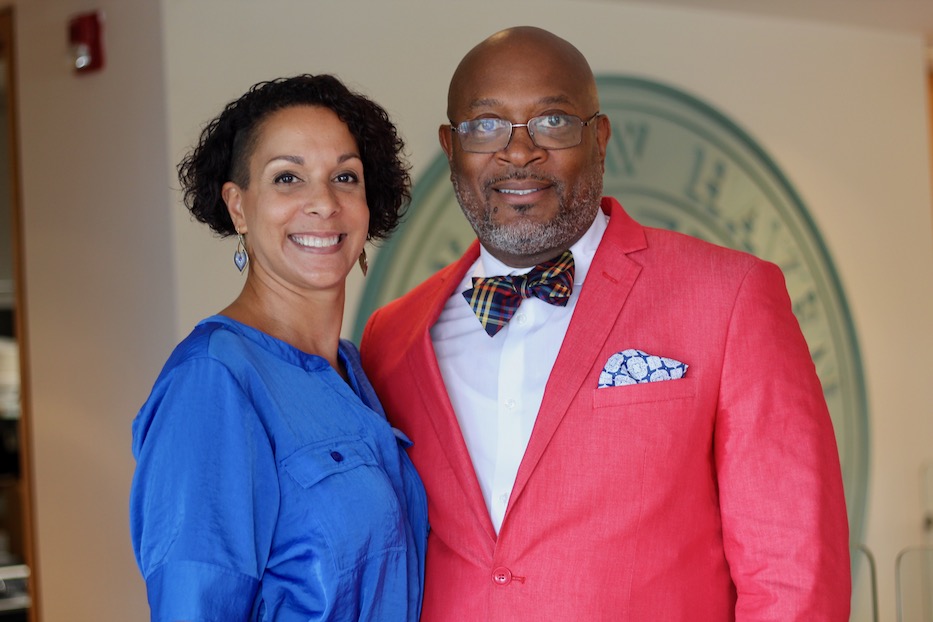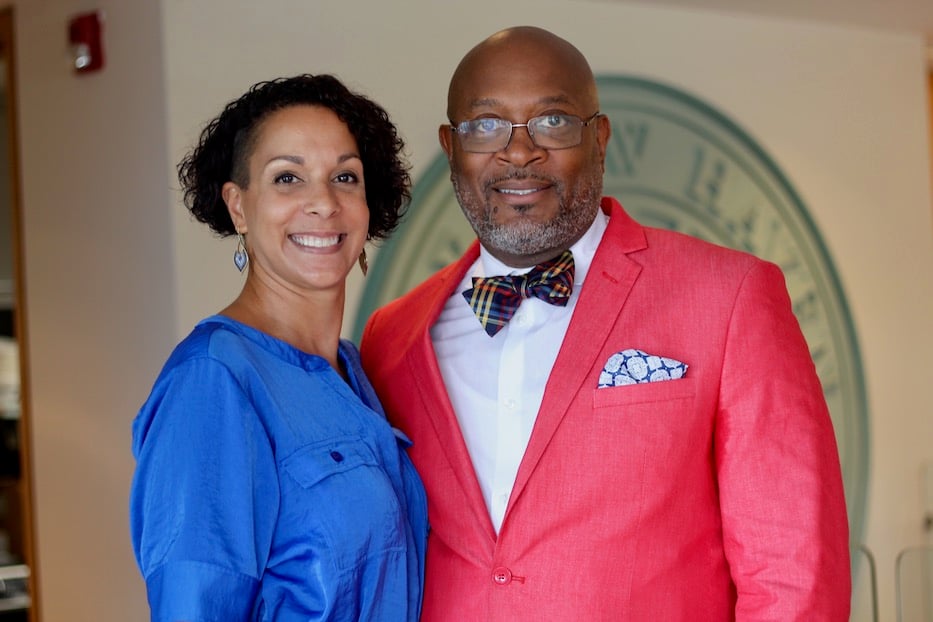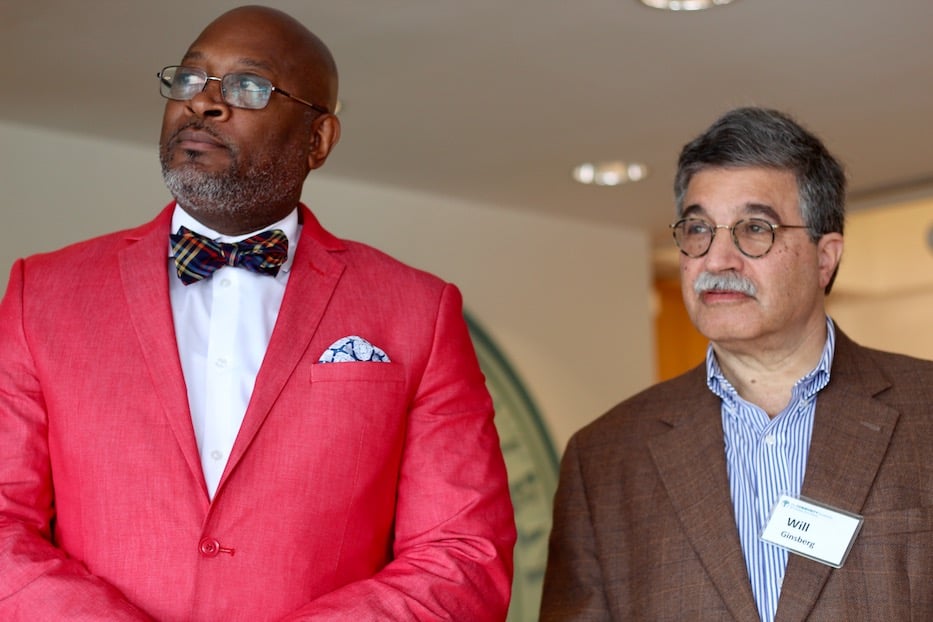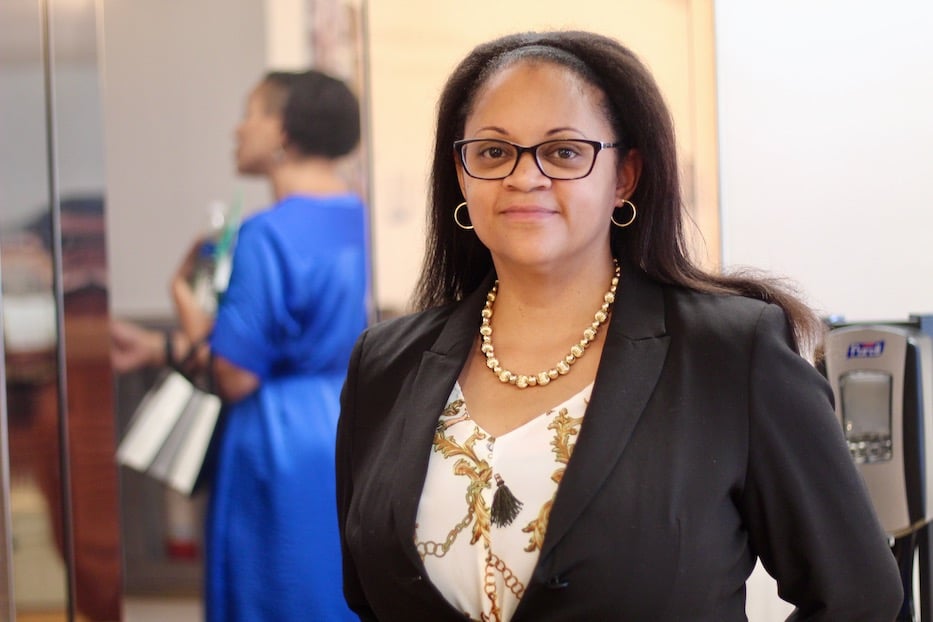
Black-owned businesses | Culture & Community | Economic Development | Arts & Culture | Elicker Administration | Arts & Anti-racism

Yvonne Alston and Joseph W. Williams Jr. Lucy Gellman Photo.
When Yvonne Alston started her consulting firm after two decades in the corporate sector, she knew she was taking a leap of faith. Three years and a network of employees later, a new $8,000 grant program for overlooked entrepreneurs is helping her succeed.
Alston is one of 125 initial grantees of the New Haven Equitable Entrepreneurial Ecosystem (NHE3), a nascent program of the Community Foundation for Greater New Haven (CFGNH) that seeks to level the playing field and grow opportunity for entrepreneurs who have historically been pushed to the margins. Monday morning, members of the CFGNH gathered with grantees, small business boosters, and city and state officials to formally announce the program.
“It’s really how we’re taking entrepreneur support organizations, those nonprofits here in the City of New Haven and around the City of New Haven, to help the residents of New Haven achieve their dreams of small business entrepreneurship,” said Joseph Williams, Jr., director of NHE3 operations. “It’s about wealth creation in our community. So often, access to capital is the root and crux of why many of us cannot grow or continue to stay in business.”

In the next five years, NHE3 plans to award roughly 750 grants, averaging $6,000 each. Of the 125 that have already been distributed, two-thirds have gone to women entrepreneurs, many of whom are Black women and non-Black women of color. It is funded by $7.2 million from the Connecticut Department of Economic & Community Development (DECD) and $1.5 million in American Rescue Plan Act (ARPA) dollars from the City of New Haven, and has also received support from Liberty Bank.
The program also offers grant recipients small business support, from mentorship to technological assistance. Learn more about it here.
NHE3, which joins other city and statewide initiatives to nurture small business development, grew out of a strategic plan that the Community Foundation has been building out for the last four years. In 2019, the foundation announced a new commitment to opportunity and equity, including more equitable pathways to entrepreneurship. Less than a full year later, the Covid-19 pandemic laid bare a city in economic contrasts—and drove that need home.
Monday, CFGNH President and Chief Executive Officer Will Ginsberg said that NHE3 was precisely the kind of work that the foundation had in mind. Although the organization is 95 years old, it has only recently begun to include the for-profit sector in its vision for inclusive growth.
Part of that is acknowledging the economic harm that has been done to entrepreneurs of color for over 400 years, and starting to address and rectify it with demonstrated and sustained financial commitment.

"We need to see economic growth that creates opportunity for everyone in this community," Ginsberg said. "It doesn't work to create greater opportunity without greater equity and it doesn't work to create greater equity without greater opportunity.”
In addition to $7.2 million from the state, the city’s contribution of $1.5 million will support organizations that boost Black and Brown artists and entrepreneurs, including several grantees who were in the audience Monday morning.
Looking out to where they sat, Mayor Justin Elicker said that these include the New Haven Chamber of Commerce, KNOWN Coworking, Collab, the Urban League of Southern Connecticut, and Minority Construction Council among others.
He said he’s proud to share a city with small, Black-owned businesses like BLOOM—where one can “find your Zen”—adding Ricky D’s Rib Shack and a recently expanded Woody’s Wings to the list.
“We can’t just rely on one sector, and that’s where small businesses come in,” Elicker said. “Because small businesses, particularly local businesses, are resilient. A dollar made by a small business, a huge percentage of that dollar is spent in the local community. A dollar made on a chain store, a lot of that money is out of the community.”

It was in the testimonials of grantees themselves, many of whom were present Monday, that the program’s impact most clearly came to life. Alisha Crutchfield, who runs the Westville-based small business BLOOM, praised NHE3 for helping her nurture her vision for a community hub in her own backyard.
For years, Crutchfield said, she didn’t believe that she could run a business in New Haven, and commuted to New York City for work. Then she took a step back, and looked around. Even in the wake of a global pandemic, she could feel a sense of possibility in her neighborhood. When a storefront opened just a block away from her, she trusted the vision.
“I saw and realized that not only could I start and raise a family, but I could start a business and raise up a community with my unique social-economic business model,” she said.
That was the beginning of a business that grossed almost $200,000 in its first year open to the public. Beaming, Crutchfield remembered walking into the city’s Small Business Resource Center (“unannounced,” she added to laughs) and getting two hours of direct business support from Deputy Director of Economic Development Cathy Graves.
It was that first meeting that led her to the Community Economic Development Fund (CEDF), which granted her the seed money to help jumpstart BLOOM. Now, two years later, she is able to support other New Haven-based small businesses by carrying their goods in her shop. Starting this month, she is also running a small food business pilot with Cafe Flora, where longtime New Havener Jacob McElligott will be running the space for the next year.
With grant funding from NHE3, she hopes to hire and mentor an operations manager, train new staff members, support professional development in the store, and purchase a delivery truck for the flower shop built into her business. Currently, BLOOM runs on three employees—meaning that she is often stretched to her limit. She did not wish to disclose the amount for which she applied, but said she is grateful for programs that help relieve the very real financial burden of running a small business.
“Community is the soul, and the NHE3—Joe Williams, Arthur Thomas, and your team—y’all are the plug,” she said. “This grant supports so much more than a business. It supports a vision. I’ll leave with this: Let’s grow, New Haven!”

Samantha "Sammi" Williams.
Monday, she was among several grant recipients who lingered in the space after the conference had ended, connecting with each other and with representatives of the program. The founder of 628 Digital Design and the Collaboration of Minority Women Professionals (CMWP), Samantha "Sammi" Williams applauded NHE3 for recognizing the need for greater economic inclusion, particularly among professionals who have long been pushed to the margins because of race and gender.
For her, an infusion of $5,000 from NHE3 will help cover payroll for eight staff members, five of whom are part-time employees and three of whom work on a contract basis. She practices what she preaches, she added: prior to Monday’s press conference, she worked closely with author and Graham-Hunt Communications Founder Stacy Graham-Hunt to put together the event.
“Traditionally, we haven’t had access to funding,” she said. NHE3, alongside other initiatives like New Haven’s Cultural Equity Plan and city- and statewide grant programs, are beginning to shift that paradigm.
Alston, who runs the Newington-based consulting firm Indelible Impressions, said she is also grateful for the support. Born and raised in public housing in Middletown, Alston got to know New Haven as a teenager and young adult, when she was studying English and legal studies as an undergraduate at Quinnipiac University. After working for 22 years in the corporate sector, she decided that she wanted to build her own business.
Originally, “I was a solopreneur” with a vision and a lot of grit, she said. With the blessing of her husband and a group of fellow Black women in business (“My personal board of directors,” she joked), Indelible Impressions launched three years ago from an office space in Newington. It now employs a team of consultants across the U.S., with a presence in San Francisco, Denver, and along the Eastern seaboard.
“There were so many nuances that I didn’t know” that Alston initially had to teach herself, she said. As the organization grew, she honed a focus on cultural assessments, including diversity, equity, inclusion and belonging (DEIB) work and trainings. With the $8,000 that she received from NHE3, she plans to implement a new learning management system and provide support to a growing, all-woman team.
“For many reasons, we have been hidden figures,” she said before heading towards the elevator for another long day of work. “We have taken a backseat because of racism, because of people not ready to see us at certain tables, certain seats, certain pulpits. This is definitely a moment that we are in and I think people are starting to understand.”

